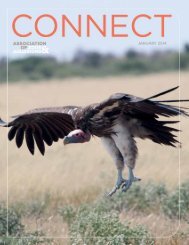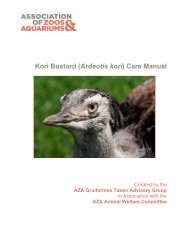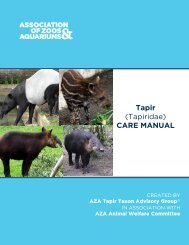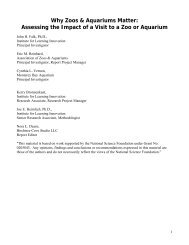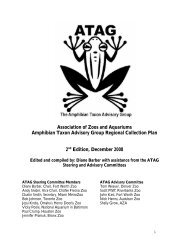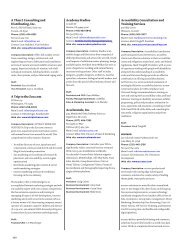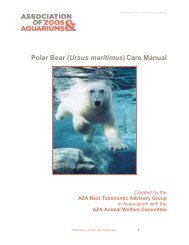Otter (Lutrinae) Care Manual - Association of Zoos and Aquariums
Otter (Lutrinae) Care Manual - Association of Zoos and Aquariums
Otter (Lutrinae) Care Manual - Association of Zoos and Aquariums
Create successful ePaper yourself
Turn your PDF publications into a flip-book with our unique Google optimized e-Paper software.
<strong>Association</strong> <strong>of</strong> <strong>Zoos</strong> <strong>and</strong> <strong>Aquariums</strong> 116<br />
<strong>Otter</strong> (<strong>Lutrinae</strong>) <strong>Care</strong> <strong>Manual</strong><br />
Ideally, release from quarantine should be dependent on obtaining two negative fecal results spaced a<br />
minimum <strong>of</strong> two weeks apart either initially or after parasiticide treatment. In addition, all animals should<br />
be evaluated for ectoparasites <strong>and</strong> treated accordingly. Vaccinations should be updated as appropriate<br />
for each species. If the animal arrives without a vaccination history, it should be treated as an<br />
immunologically naive animal <strong>and</strong> given an appropriate series <strong>of</strong> vaccinations. Whenever possible, blood<br />
should be collected <strong>and</strong> sera banked. Either a -70ºC freezer or a -20ºC freezer that is not frost-free<br />
should be available to save sera. Such sera could provide an important resource for retrospective disease<br />
evaluation. The quarantine period also represents an opportunity to, where possible, permanently identify<br />
all unmarked animals when anesthetized or restrained (e.g., tattoo, ear notch, ear tag, etc.). Also,<br />
whenever animals are restrained or immobilized, a complete physical, including a dental examination,<br />
should be performed. Complete medical records should be maintained <strong>and</strong> available for all animals<br />
during the quarantine period. Animals that die during quarantine should have a necropsy performed under<br />
the supervision <strong>of</strong> a veterinarian <strong>and</strong> representative tissues submitted for histopathologic examination.”<br />
Quarantine procedures: The following are recommendations <strong>and</strong> suggestions for appropriate quarantine<br />
procedures for small carnivores:<br />
Required Strongly recommended<br />
1) Direct <strong>and</strong> floatation fecal exam 1) CBC/sera pr<strong>of</strong>ile<br />
2) Vaccinate as appropriate 2) Urinalysis<br />
3) Appropriate serology (FIP, FeLV, FIV)<br />
4) Heartworm testing in appropriate species



